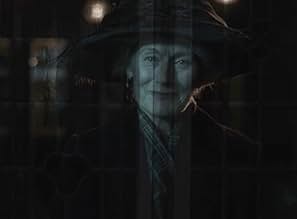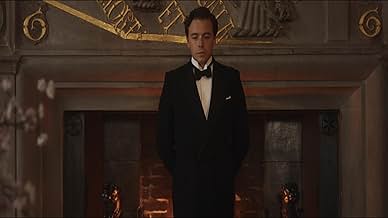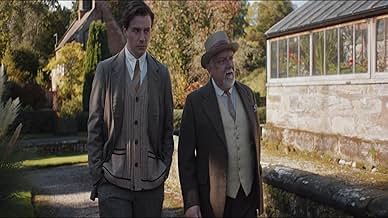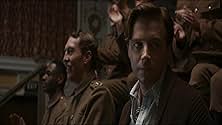AVALIAÇÃO DA IMDb
6,6/10
4,2 mil
SUA AVALIAÇÃO
A história do poeta, escritor e soldado inglês Siegfried Sassoon.A história do poeta, escritor e soldado inglês Siegfried Sassoon.A história do poeta, escritor e soldado inglês Siegfried Sassoon.
- Prêmios
- 9 vitórias e 19 indicações no total
Avaliações em destaque
Davies is a masterful filmmaker. He has stated that he is not a "Gay" filmmaker in the way that, possibly, Jarman was. I think this is generally true. Davies seems more concerned with individual struggle and self-expression than homosexual rights. His period films recall a time when individuals created and asserted their identity in opposition to social conformity. While he emphasizes the personal and the private sphere of experience, he also recognizes how these can transform society. A Quiet Passion, Sunset Song, and Benediction are about people revolting in very unique ways. The performances and control of other elements are subtle, complex, and always interesting.
A slow, stately biopic about poet Siegried Sassoon and the demons that plagued him after serving in WWI.
The movie has serious Evelyn Waugh vibes, especially "Brideshead Revisited." WWI stories always fascinate me, especially when they're about how much the war screwed up the psyches of the people who were caught up in it. This film is overall satisfying, if a bit repetitive. A huge amount of time is spent on Sassoon, a more or less openly gay man, and his various love affairs, all with caricatures of flamboyant, bitchy gay men and all of them leaving you wondering what he wanted to be around them for in the first place. Seriously, were all gay men this hateful in the 1920s? But then you think about how marginalized they were, and the answer is, well, yeah, maybe they were. They had a lot to be hateful about.
The one reason to see this movie is a big one, and that's the central performance of Jack Lowden. He's magnificent in this. Easily award worthy, though a group like the Academy Awards wouldn't recognize him in a million years.
Grade: A-
The movie has serious Evelyn Waugh vibes, especially "Brideshead Revisited." WWI stories always fascinate me, especially when they're about how much the war screwed up the psyches of the people who were caught up in it. This film is overall satisfying, if a bit repetitive. A huge amount of time is spent on Sassoon, a more or less openly gay man, and his various love affairs, all with caricatures of flamboyant, bitchy gay men and all of them leaving you wondering what he wanted to be around them for in the first place. Seriously, were all gay men this hateful in the 1920s? But then you think about how marginalized they were, and the answer is, well, yeah, maybe they were. They had a lot to be hateful about.
The one reason to see this movie is a big one, and that's the central performance of Jack Lowden. He's magnificent in this. Easily award worthy, though a group like the Academy Awards wouldn't recognize him in a million years.
Grade: A-
It's an anti-war biopic of the English poet Siegfried Sassoon that covers Sassoon's life from 1914 to the 1960s.
Siegfried Sassoon (Jack Lowden/Peter Capaldi) was a Second Lieutenant during World War I. His younger brother, Hamo (Thom Ashley), is killed during the war. Siegfried is further horrified by the tremendous human toll in death and lifelong disability caused by military leadership in which he no longer believes. Already a well-known poet, he refuses further participation in the war and is sent to the Craiglockhart War Hospital near Edinburgh technically for shell shock. There Siegfried meets and befriends Wilfred Owen (Matthew Tennyson), a much younger man. Siegfried also explicitly recognizes his own homosexuality.
The film then follows his anti-war sensibilities through snippets of his poetry and his chaotic love life, mainly focused on Ivor Novello (Jeremy Irvine) and Stephen Tennant (Calam Lynch/Anton Lesser). At a certain point, he tries to escape the chaos by marrying Hester Gatty (Kate Phillips/Gemma Jones). Together they have a son. George (Richard Goulding), but clearly, the marriage does not heal Sassoon's memories.
The film uses footage from the trenches in World War I and occasionally flips in time between the young Sassoon and the elderly Sassoon. Some of the editing decisions made little sense to me, particularly the early scene forecasting his conversion to Catholicism. Some edits made the film more complex than necessary. Nevertheless, the movie successfully portrays Sassoon as disabled because of World War I, from which he never psychologically recovered. This is clear from the multiple references to Wilfred Owens' poem, "Disabled."
Siegfried Sassoon (Jack Lowden/Peter Capaldi) was a Second Lieutenant during World War I. His younger brother, Hamo (Thom Ashley), is killed during the war. Siegfried is further horrified by the tremendous human toll in death and lifelong disability caused by military leadership in which he no longer believes. Already a well-known poet, he refuses further participation in the war and is sent to the Craiglockhart War Hospital near Edinburgh technically for shell shock. There Siegfried meets and befriends Wilfred Owen (Matthew Tennyson), a much younger man. Siegfried also explicitly recognizes his own homosexuality.
The film then follows his anti-war sensibilities through snippets of his poetry and his chaotic love life, mainly focused on Ivor Novello (Jeremy Irvine) and Stephen Tennant (Calam Lynch/Anton Lesser). At a certain point, he tries to escape the chaos by marrying Hester Gatty (Kate Phillips/Gemma Jones). Together they have a son. George (Richard Goulding), but clearly, the marriage does not heal Sassoon's memories.
The film uses footage from the trenches in World War I and occasionally flips in time between the young Sassoon and the elderly Sassoon. Some of the editing decisions made little sense to me, particularly the early scene forecasting his conversion to Catholicism. Some edits made the film more complex than necessary. Nevertheless, the movie successfully portrays Sassoon as disabled because of World War I, from which he never psychologically recovered. This is clear from the multiple references to Wilfred Owens' poem, "Disabled."
My Review- Benediction
My Score 7/10
I always find something to enjoy in a Terence Davies film but often come away thinking that his screenplays and Direction tell us more about Terence Davies than they do about the subject of his story .
The subject in this movie is Siegfried Loraine Sassoon CBE who was born on September 8th 1886 . He was a famous English war poet, writer, and soldier who was decorated for bravery on the Western Front and became one of the leading poets of the First World War.
I was surprised to read that Terence Davies the writer and Director of Benediction has only made feature 24 films . Three of those are biographical and known as the Terence Davies Trilogy Distant Voices, Still Lives (1988), The Long Day Closes (1992) and the collage film Of Time and the City (2008) a nostalgic look at his birthplace city Liverpool U. K. In 2000 Terence Davies Directed and wrote the screenplay for his movie adaptation of The House of Mirth the 1905 novel by American author Edith Wharton.
After seeing Benediction Terence David's most recent movie I looked back on my previous review of his last feature film "A Quiet Passion " (2016) about the life of Emily Dickinson the famous American poet . I was interested to see that I felt similarly about that movie as do about "Benediction." a quote from my review- of A Quiet Passion ."
A bleak film written and directed by Terence Davies I thought though at times it's very beautiful that it would have been more balanced if he had shown less suffering and more of the joyful influences that inspired her poetry . I doubt her life was all despair and angst, perhaps it says more about Terence Davies than Emily Dickinson.
After seeing Benediction I read that Terence Davies has said I don't like being gay. It has ruined my life. I am celibate, although I think I would have been celibate even if I was straight because I'm not good-looking; why would anyone be interested in me? And nobody has been. Work was my substitute.
I think I understand all his films a little better after reading that as they all have a poetic undertone of sadness and regret while still at the same time especially in Benediction display the gift of panache and sophistication that many older Gay men ,especially in the film and television industry possess .
Benediction traces the life of the famous English poet Siegfried Sassoon CBE who was a brave and decorated First World War hero who won the Military Cross then left the Army and in 1917 .
Sassoon wrote his "Soldiers Declaration."in which he described the horrors of the trenches and satirised the pretensions of those responsible in his view that promoted a jingoistic-fuelled war.
This of course outraged the British Parliament and the Army Chiefs and resulted in Siegfried Sassoon being sent to a War Hospital in Edinburgh where he was treated for shell shock.
Jack Lowdon a Scottish actor who was so good in Dunkirk as an RAF fighter pilot is very impressive as the young and charming Siegfried Sassoon .
Siegfried has a number of affairs with male lovers including the famous and handsome actor composer Ivor Novello and later a very interesting affair with German Prince Philipp of Hesse which oddly is not mentioned in this story?
I wondered why after reading more about Siegfried's affairs that stated the two men exchanged love letters after meeting in Rome in 1922. The affair ended apparently due to Prince Phillipp of Hesse's promiscuity but in Sassoon's diary he wrote "I am the only one of P's regular succession of affairs " A biographical movie of course can't tell the whole story and we do get a glimpse of the elegant and sophisticated literary and art circles that Siegfried Sassoon and his friends frequented . However I found out much more about Siegfried Sassoon after seeing the movie Benediction than before.
The apparent sadness of Siegfried Sassoon's later life is portrayed by Peter Capaldi as the aged and bitter Siegfried who after marrying Hester Gatty in 1933 ( in reality 2O years his junior) rages at his son and friends this to me seemed at odds with his younger self. Perhaps I'm reading more into it but I wondered if Terence Davies was transferring some of his own regret about his own sexuality into the character by depicting a sad closeted existence?.
The elder Hester is played by the wonderful Gemma Jones and she also is a reflection of a sad marriage .
These facts about Siegfried Sassoon's last years depicted in Terence Davies film are at odds with the truth as Siegfried and Hester separated in 1945 after 12 years of marriage when Siegfried was unable to find a compromise between the "companionship " and solitude he craved.
Their son George Sassoon( 1936 -2006) became a scientist and linguist ,and author and was adored by Siegfried,who wrote several poems addressed to his son.
This information just made me think while this movie is well crafted and interesting that it's missing the true character of its subject Siegfried Sassoon.
My Score 7/10
I always find something to enjoy in a Terence Davies film but often come away thinking that his screenplays and Direction tell us more about Terence Davies than they do about the subject of his story .
The subject in this movie is Siegfried Loraine Sassoon CBE who was born on September 8th 1886 . He was a famous English war poet, writer, and soldier who was decorated for bravery on the Western Front and became one of the leading poets of the First World War.
I was surprised to read that Terence Davies the writer and Director of Benediction has only made feature 24 films . Three of those are biographical and known as the Terence Davies Trilogy Distant Voices, Still Lives (1988), The Long Day Closes (1992) and the collage film Of Time and the City (2008) a nostalgic look at his birthplace city Liverpool U. K. In 2000 Terence Davies Directed and wrote the screenplay for his movie adaptation of The House of Mirth the 1905 novel by American author Edith Wharton.
After seeing Benediction Terence David's most recent movie I looked back on my previous review of his last feature film "A Quiet Passion " (2016) about the life of Emily Dickinson the famous American poet . I was interested to see that I felt similarly about that movie as do about "Benediction." a quote from my review- of A Quiet Passion ."
A bleak film written and directed by Terence Davies I thought though at times it's very beautiful that it would have been more balanced if he had shown less suffering and more of the joyful influences that inspired her poetry . I doubt her life was all despair and angst, perhaps it says more about Terence Davies than Emily Dickinson.
After seeing Benediction I read that Terence Davies has said I don't like being gay. It has ruined my life. I am celibate, although I think I would have been celibate even if I was straight because I'm not good-looking; why would anyone be interested in me? And nobody has been. Work was my substitute.
I think I understand all his films a little better after reading that as they all have a poetic undertone of sadness and regret while still at the same time especially in Benediction display the gift of panache and sophistication that many older Gay men ,especially in the film and television industry possess .
Benediction traces the life of the famous English poet Siegfried Sassoon CBE who was a brave and decorated First World War hero who won the Military Cross then left the Army and in 1917 .
Sassoon wrote his "Soldiers Declaration."in which he described the horrors of the trenches and satirised the pretensions of those responsible in his view that promoted a jingoistic-fuelled war.
This of course outraged the British Parliament and the Army Chiefs and resulted in Siegfried Sassoon being sent to a War Hospital in Edinburgh where he was treated for shell shock.
Jack Lowdon a Scottish actor who was so good in Dunkirk as an RAF fighter pilot is very impressive as the young and charming Siegfried Sassoon .
Siegfried has a number of affairs with male lovers including the famous and handsome actor composer Ivor Novello and later a very interesting affair with German Prince Philipp of Hesse which oddly is not mentioned in this story?
I wondered why after reading more about Siegfried's affairs that stated the two men exchanged love letters after meeting in Rome in 1922. The affair ended apparently due to Prince Phillipp of Hesse's promiscuity but in Sassoon's diary he wrote "I am the only one of P's regular succession of affairs " A biographical movie of course can't tell the whole story and we do get a glimpse of the elegant and sophisticated literary and art circles that Siegfried Sassoon and his friends frequented . However I found out much more about Siegfried Sassoon after seeing the movie Benediction than before.
The apparent sadness of Siegfried Sassoon's later life is portrayed by Peter Capaldi as the aged and bitter Siegfried who after marrying Hester Gatty in 1933 ( in reality 2O years his junior) rages at his son and friends this to me seemed at odds with his younger self. Perhaps I'm reading more into it but I wondered if Terence Davies was transferring some of his own regret about his own sexuality into the character by depicting a sad closeted existence?.
The elder Hester is played by the wonderful Gemma Jones and she also is a reflection of a sad marriage .
These facts about Siegfried Sassoon's last years depicted in Terence Davies film are at odds with the truth as Siegfried and Hester separated in 1945 after 12 years of marriage when Siegfried was unable to find a compromise between the "companionship " and solitude he craved.
Their son George Sassoon( 1936 -2006) became a scientist and linguist ,and author and was adored by Siegfried,who wrote several poems addressed to his son.
This information just made me think while this movie is well crafted and interesting that it's missing the true character of its subject Siegfried Sassoon.
"Many live for the moment, you live for the eternity" British poet Siegfried Sassoon's son to his father in his final days--as the poet continues to bemoan the dead soldiers of of WWI who died for a cause that had changed from what it was when they enlisted. Thanks to Terrence Davies' film I have come to appreciate Sassoon's poetry. As a film, I prefer the comparable film "Under Milkwood" on the life and poetry of Dylan Thomas. A trivial highlight of the film: T E Lawrence (a.k.a. Lawrence of Arabia) attending the very private wedding of Sassoon! Though mentioned briefly as an admirer of the poet Sassoon, Noel Coward never gets shown in the film. Some aspects of the screenplay are very impressive, while some are not (switching back and forth in time, needlessly, those relating to one of Sassoon's many gay paramours).
Você sabia?
- CuriosidadesSeven of Siegfried Sassoon's poems were narrated in the film: Concert Interpretation, Died of Wounds, When I'm among a Blaze of Lights, To my Mother, To my Brother, Attack, and Invocation.
- Erros de gravaçãoSassoon did not discard his M.C. medal as shown in this film. He tossed away the medal's corresponding ribbon. The medal itself was inherited by Sassoon's son George.
- Citações
Dr. Rivers: Why not?
Siegfried Sassoon: Too afraid, too inhibited. Shamed by an inner corruption. Or perhaps it's simply because of... What's the phrase? "The love that dare not speak its name."
Dr. Rivers: You are not alone in that respect.
Principais escolhas
Faça login para avaliar e ver a lista de recomendações personalizadas
- How long is Benediction?Fornecido pela Alexa
Detalhes
- Data de lançamento
- Países de origem
- Centrais de atendimento oficiais
- Idiomas
- Também conhecido como
- 베네딕션
- Locações de filme
- Chillington Hall, Port Lane, Brewood, Wolverhampton WV8 1RE, Reino Unido(Interiors and outdoor scenes)
- Empresas de produção
- Consulte mais créditos da empresa na IMDbPro
Bilheteria
- Faturamento bruto nos EUA e Canadá
- US$ 201.093
- Fim de semana de estreia nos EUA e Canadá
- US$ 50.970
- 5 de jun. de 2022
- Faturamento bruto mundial
- US$ 847.418
Contribua para esta página
Sugerir uma alteração ou adicionar conteúdo ausente





















